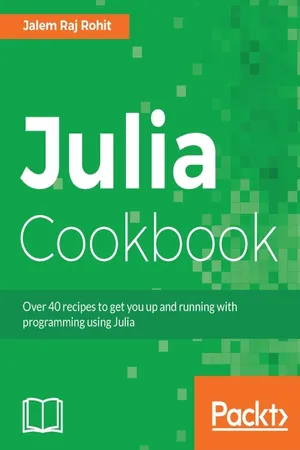
- 172 pages
- English
- ePUB (mobile friendly)
- Available on iOS & Android
Julia Cookbook
About this book
Over 40 recipes to get you up and running with programming using Julia
About This Book
- Follow a practical approach to learn Julia programming the easy way
- Get an extensive coverage of Julia's packages for statistical analysis
- This recipe-based approach will help you get familiar with the key concepts in Juli
Who This Book Is For
This book is for data scientists and data analysts who are familiar with the basics of the Julia language. Prior experience of working with high-level languages such as MATLAB, Python, R, or Ruby is expected.
What You Will Learn
- Extract and handle your data with Julia
- Uncover the concepts of metaprogramming in Julia
- Conduct statistical analysis with StatsBase.jl and Distributions.jl
- Build your data science models
- Find out how to visualize your data with Gadfly
- Explore big data concepts in Julia
In Detail
Want to handle everything that Julia can throw at you and get the most of it every day? This practical guide to programming with Julia for performing numerical computation will make you more productive and able work with data more efficiently. The book starts with the main features of Julia to help you quickly refresh your knowledge of functions, modules, and arrays. We'll also show you how to utilize the Julia language to identify, retrieve, and transform data sets so you can perform data analysis and data manipulation.
Later on, you'll see how to optimize data science programs with parallel computing and memory allocation. You'll get familiar with the concepts of package development and networking to solve numerical problems using the Julia platform.
This book includes recipes on identifying and classifying data science problems, data modelling, data analysis, data manipulation, meta-programming, multidimensional arrays, and parallel computing. By the end of the book, you will acquire the skills to work more effectively with your data.
Style and approach
This book has a recipe-based approach to help you grasp the concepts of Julia programming.
Tools to learn more effectively

Saving Books

Keyword Search

Annotating Text

Listen to it instead
Information
Julia Cookbook
Julia Cookbook
Credits
| Author Jalem Raj Rohit | Copy Editor Pranjali Chury |
| Reviewer Jakub Glinka | Project Coordinator Izzat Contractor |
| Commissioning Editor Pratik Shah | Proofreader Safis Editing |
| Acquisition Editor Denim Pinto | Indexer Tejal Daruwale Soni |
| Content Development Editor Rohit Singh | Production Coordinator Aparna Bhagat |
| Technical Editor Abhishek R. Kotian | Cover Work Aparna Bhagat |
About the Author
I would thank my parents and my family for all their support and encouragement, which helped me make this book possible.
About the Reviewer
www.PacktPub.com
eBooks, discount offers, and more

Why subscribe?
- Fully searchable across every book published by Packt
- Copy and paste, print, and bookmark content
- On demand and accessible via a web browser
Free access for Packt account holders
@PacktEnterprise on Twitter or the Packt Enterprise Facebook page.Preface
What this bo...
Table of contents
- Julia Cookbook
Frequently asked questions
- Essential is ideal for learners and professionals who enjoy exploring a wide range of subjects. Access the Essential Library with 800,000+ trusted titles and best-sellers across business, personal growth, and the humanities. Includes unlimited reading time and Standard Read Aloud voice.
- Complete: Perfect for advanced learners and researchers needing full, unrestricted access. Unlock 1.4M+ books across hundreds of subjects, including academic and specialized titles. The Complete Plan also includes advanced features like Premium Read Aloud and Research Assistant.
Please note we cannot support devices running on iOS 13 and Android 7 or earlier. Learn more about using the app